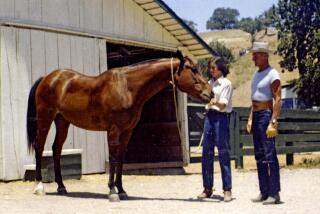Sedgwick biopic gets Bob Dylan’s attention
- Share via
Forget “Blonde on Blonde.” Try “Lawyer on Lawyer.”
A character patterned after Bob Dylan in the upcoming biopic “Factory Girl,” about the rise and drug-hastened fall of 1960s actress/model Edie Sedgwick, has prompted the folk-rock legend’s lawyers to demand that screenings be canceled until they can view the movie before it is released later this month.
The fear: that viewers might infer that Dylan was responsible for Sedgwick’s drug death in November 1971, several years after she and Dylan had become close while living in Manhattan’s infamous Chelsea Hotel.
A letter sent by Dylan’s lawyers claimed that the portrayal “remains both defamatory and a violation of Mr. Dylan’s right of publicity” and demanded that all screenings be canceled.
Orin Snyder, a lawyer for Dylan, declined comment, saying he was not authorized to discuss the matter. Attempts to reach the producers -- Holly Wiersma and Aaron Richard Golub -- were unsuccessful. Spokeswoman Sarah Rothman declined comment for the Weinstein Co., which has scheduled a limited Dec. 29 release for Oscar consideration.
The movie script initially named Dylan and implied that he and Sedgwick had a romantic relationship before Dylan cast her aside, a series of events that launched “her tragic decline into heroin addiction and eventual suicide,” according to the letter, first reported in the New York Post’s “Page 6” gossip column Thursday. A source confirmed the contents of the letter but declined to provide a copy to The Times.
In the movie, the folk-rocker’s character has been morphed into “Billy Quinn,” purportedly drawing from several performers. But people who have seen the movie say Quinn, played by Hayden Christensen, has Dylan’s mannerisms and sports a checked scarf similar to the one Dylan has on the cover of his classic “Blonde on Blonde” album -- on which, legend has it, Sedgwick inspired two songs: “Just Like a Woman” and “Leopard-Skin Pill-Box Hat.”
“You appear to be laboring under the misunderstanding that merely changing the name of a character or making him a purported fictional composite will immunize you from suit,” Snyder said in the letter. “That is not so.”
Sedgwick became part of Andy Warhol’s Factory in the 1960s before she left to try to establish an independent career in movies, a dream that crumbled with her drug use and lengthy stay at treatment centers.
More to Read
Only good movies
Get the Indie Focus newsletter, Mark Olsen's weekly guide to the world of cinema.
You may occasionally receive promotional content from the Los Angeles Times.








